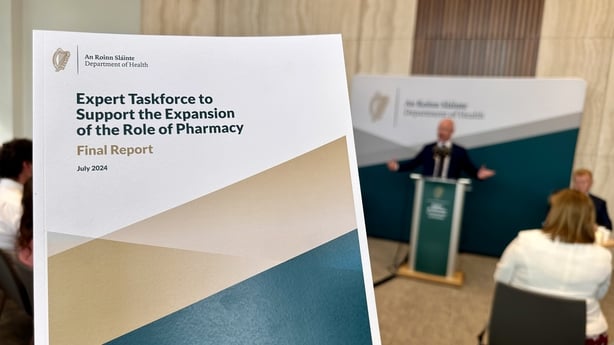The president of the Irish Medical Organisation (IMO) has said he has concerns for patient safety in relation to a new plan which will allow pharmacists to diagnose and write prescriptions for eight common conditions.
The initial list of conditions are allergic rhinitis, cold sores, conjunctivitis, impetigo, oral thrush, shingles, cystitis and thrush.
These changes are due to come into force early next year.
Pharmacists will be offered training by the Pharmaceutical Society of Ireland to deliver the new services.
From September, pharmacists will also be allowed to extend certain GP prescriptions from the current maximum period of six months to 12 months.
However, Dr Denis McCauley, who is a GP in Co Donegal, said that a report commissioned by the UK parliament showed that patient care becomes "sub-optimal" when it is fragmented.
"The other thing is being able to prescribe for something isn't the same as being able to diagnose for a condition," he told RTÉ's Drivetime.
Dr McCauley added that the symptoms of common conditions can sometimes be symptoms of more serious issues and can cause a delay to a patient receiving a correct diagnosis.
The IMO president said: "Sometimes those symptoms are not actually what they seem.
"I think there is a tendency ... where they think you can replace the work of a doctor with another agency when in fact the only way to replace a doctor is with another doctor."
Minister for Health Stephen Donnelly said the changes will alleviate pressure on GPs and the service will be expanded to other conditions.
Speaking on RTÉ's News at One, Minister Donnelly said pharmacists will have the ability to operate a "common conditions service".
"There are lots of people who have something minor wrong with them, they need a prescription, the pharmacist can tell them immediately what it is ... but you have got to go to your GP.
"The GPs are busy. In some parts of the country, it's getting better and better, some parts of the country I know people are still waiting a long time to get to their GP," he said.
He added: "This is all about making it quicker and easier for members of the public to access medicine. It's better for the public, it's good for the pharmacists and it's good for GPs because it'll free up some of their time to see the more complex patients."
However, a fee for this new service has yet to be agreed with pharmacists and the minister said negotiations with the Irish Pharmacy Union (IPU) over a price for medical card holders are yet to be held.
Mr Donnelly indicated that the fee for private patients will be up to the discretion of each pharmacist.
"That will be a matter for each pharmacist. So for the three in four people in the country who don't have a medal card the pharmacist will be able to set that.
"I imagine how it'll work is that some of the consultations will be quick. They'll be able to say 'look, you've got conjunctivitis or a minor rash', but other consultations they may want to check weight, blood pressure and maybe they'll have a differentiated scale."
The Expert Taskforce to Support the Expansion of the Role of Pharmacy was published today by the minister.
We need your consent to load this rte-player contentWe use rte-player to manage extra content that can set cookies on your device and collect data about your activity. Please review their details and accept them to load the content.Manage Preferences
The IPU welcomed the recommendations, but IPU President Tom Murray said the union would be recommending to its members not to implement the changes for both public and private patients until a long-standing pay freeze was resolved.
Minister Donnelly said the department will be directed to enter into formal pay talks with the IPU after Budget 2025.
He said: "They have a very longstanding ask for their current fee structure, for the great work they already do, for those fees to be increased. It's been a long time since there’s been an increase.
"What I’ve said to them through the year, and I’m happy to repeat it now, is after the Budget, when we know how much money is available...I am going to instruct my department to enter into formal talks with the IPU."
Mr Murray said pay had been frozen for 16 years and that the union would want to see substantive progress before implementing any changes.





